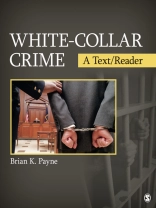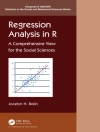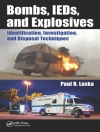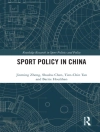White-Collar Crime: A Text/Reader incorporates contemporary and classic readings (some including policy implications) accompanied by original text that provides a theoretical framework and context for students. This comprehensive book covers topics including crimes by workers in sales-oriented systems; crimes in the health care system; crimes by criminal justice professionals and politicians; crimes in the educational system; crimes in the economic and technological systems; crimes by employees in the housing industry; corporate crime; environmental crime; explanations of white-collar crime; and the police and court responses to white-collar crime.
Daftar Isi
Foreword
Preface
Acknowledgments
SECTION I. Introduction and Overview of White-Collar Crime: A Systems Perspective
How to Read a Research Article
Reading:
1. Crime and Business, by Edwin H. Sutherland
SECTION II. Understanding White-Collar Crime: Definitions, Extent, and Consequences
Readings:
2. White-Collar and Professional Crime: The Challenge for the 1980s, by Herbert Edelhertz
3. Occupational Crime, Occupational Deviance, and Workplace Crime: Sorting Out the Differences, by David O. Friedrichs
SECTION III. Crimes in Sales-Related Occupations: A Systems Perspective
Readings:
4. The Appliance Repairman: A Study of Victim-Responsiveness and Fraud, by Diane Vaughan and Giovanna Carlo
5. Employee Theft and Efficacy of Certain Control Procedures in Commercial Food Service Operations, by Richard Ghiselliand Joseph A. Ismail
SECTION IV. Crimes in the Health Care System
Readings:
6. The Enforcement of Criminal Laws: Testimony to the House od Representatives Committee on the Judiciary, Subcommittee on Crime, Terrorism and Homeland Security, by James Frogue
7. Illicit Prescription Drug Use Among Pharmacists: Evidence of a Paradox of Familiarity, by Dean A. Dabney and Richard C. Hollinger
SECTION V. Crime in Systems of Social Control: White-Collar Crime in Criminal Justice, Political, and Religious Systems
Readings:
8. Violated Trust: Conceptualizing Prosecutorial Misconduct, by Heather Schoenfeld
9. Uncollaring the Criminal: Understanding the Criminal Careers of Criminal Clerics, by Alex R. Piquero, Nicole Leeper Piquero, Karen J. Terry, Tasha Youstin, and Matt Nobles
SECTION VI. Crimes in the Educational System
Readings:
10. Intimidating Education: Sexual Harassment in Criminology, by Elizabeth A. Stanko
11. ORI Findings of Scientific Misconduct in Clinical Trials and Publicly Funded Research, 1992-2002, by Sandra M. Reynolds
SECTION VII. Crime in the Economic and Technological Systems
Readings:
12. Insider Trading: The SEC Meets Karl Karcher, by Elizabeth Szockyj
13. Cybercrime Against Businesses, by Ramona R. Rantala
SECTION VIII. Crimes in the Housing System
Readings:
14. The Mortgage Meltdown as Normal Accidental Wrongdoing, by Donald Palmer and Michael W. Maher
15. 2009 Mortgage Fraud Report ‘Year in Review, ‘ by the Federal Bureau of Investigation
SECTION IX. Crimes by the Corporate System
Readings:
16. Is Corporate Crime Serious Crime? Criminal Justice and Corporate Crime Control, by Ronald C. Kramer
17. Food for Thought: An Investigation of Food and Drug Administration Reporting Practices, 1995-1999, by Michael J. Lynch, Roonald J. Burns, and Jefferson E. Holcomb
SECTION X. Environmental Crime
Readings:
18. Corporate Environmental Crimes and Social Inequality: New Directions for Environmental Justice Research, by David R. Simon
19. Crimes Against the Environment: Superfund Enforcement at Last, by Harold C. Barnett
SECTION XI. Explaining White-Collar Crime
Readings:
20. Are White-Collar and Common Offenders the Same? An Empirical and Theoretical Critique of a Recently Proposed General Theory of Crime, by Michael L. Benson and Elizabeth Moore
21. Completely Out of Control or the Desire to Be in Control? How Low Self-Control and the Desire for Control Relate to Corporate Offending, by Nicole Leeper Piquero, Andrea Schoepfer, and Lynn Langton
22. White-Collar Crime and Criminal Careers: Specifying a Trajectory of Punctuated Situational Offending, by Nicole Leeper Piquero and Michael L. Benson
SECTION XII. Policing White-Collar Crime
Readings:
23. Documenting Inadequate Care in the Nursing Home: The Story of an Undercover Agent, by Garrett E. Speaks
24. Government Whistleblowers: Crime′s Hidden Victims, by Carleen A. Botsko and Robert C. Wells
SECTION XIII. Judicial Proceedings and White-Collar Crime
Readings:
25. Local Prosecutors and Corporate Crime, by Michael L. Benson, Francis T. Cullen, and William J. Maakestad
26. Whistleblowing and Lawyers, by Barbara A. Belbot
SECTION XIV. The Corrections Subsystem and White-Collar Crime
Readings:
27. The Special Sensitivity of White-Collar Offenders to Prison: A Critique and Research Agenda, by Michael L. Benson and Francis T. Cullen
28. ‘Club Fed’ in Japan? Incarceration Experiences of Japanese Embezzlers, by Jurg Gerber
29. White-Collar Crime and Criminal Careers: Some Preliminary Findings, by David Weisburd, Ellen F. Chayet, and Elin J. Waring
Glossary
References
Credits and Sources
Index
About the Author
Tentang Penulis
Brian K. Payne received his doctorate in criminology from Indiana University of Pennsylvania in 1993. He is currently the vice provost for academic affairs at Old Dominion University, where he is tenured in the Department of Sociology and Criminal Justice, and the chair of the Hampton Roads Cybersecurity Education, Workforce, and Economic Development Alliance. He is a former editor of the American Journal of Criminal Justice, past president of the Academy of Criminal Justice Sciences and past president of the Southern Criminal Justice Association. Payne is the author or coauthor of more than 160 journal articles and seven books including White-Collar Crime: The Essentials (Sage), Family Violence and Criminal Justice (Elsevier, with Randy Gainey), and Crime and Elder Abuse: An Integrated Perspective (Charles C Thomas). He won the local Pinewood Derby when he was in the fourth grade.












